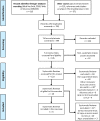Prescribable mHealth apps identified from an overview of systematic reviews
- PMID: 31304297
- PMCID: PMC6550270
- DOI: 10.1038/s41746-018-0021-9
Prescribable mHealth apps identified from an overview of systematic reviews
Abstract
Mobile health apps aimed towards patients are an emerging field of mHealth. Their potential for improving self-management of chronic conditions is significant. Here, we propose a concept of "prescribable" mHealth apps, defined as apps that are currently available, proven effective, and preferably stand-alone, i.e., that do not require dedicated central servers and continuous monitoring by medical professionals. Our objectives were to conduct an overview of systematic reviews to identify such apps, assess the evidence of their effectiveness, and to determine the gaps and limitations in mHealth app research. We searched four databases from 2008 onwards and the Journal of Medical Internet Research for systematic reviews of randomized controlled trials (RCTs) of stand-alone health apps. We identified 6 systematic reviews including 23 RCTs evaluating 22 available apps that mostly addressed diabetes, mental health and obesity. Most trials were pilots with small sample size and of short duration. Risk of bias of the included reviews and trials was high. Eleven of the 23 trials showed a meaningful effect on health or surrogate outcomes attributable to apps. In conclusion, we identified only a small number of currently available stand-alone apps that have been evaluated in RCTs. The overall low quality of the evidence of effectiveness greatly limits the prescribability of health apps. mHealth apps need to be evaluated by more robust RCTs that report between-group differences before becoming prescribable. Systematic reviews should incorporate sensitivity analysis of trials with high risk of bias to better summarize the evidence, and should adhere to the relevant reporting guideline.
Keywords: Health care; Translational research.
Conflict of interest statement
Competing interestsThe authors declare no competing financial interests.
Figures


Similar articles
-
Feasibility of a Web-Based Platform (Trial My App) to Efficiently Conduct Randomized Controlled Trials of mHealth Apps For Patients With Cardiovascular Risk Factors: Protocol For Evaluating an mHealth App for Hypertension.JMIR Res Protoc. 2021 Feb 1;10(2):e26155. doi: 10.2196/26155. JMIR Res Protoc. 2021. PMID: 33522978 Free PMC article.
-
The Potential of Mobile Apps for Improving Asthma Self-Management: A Review of Publicly Available and Well-Adopted Asthma Apps.JMIR Mhealth Uhealth. 2017 Aug 2;5(8):e113. doi: 10.2196/mhealth.7177. JMIR Mhealth Uhealth. 2017. PMID: 28768606 Free PMC article.
-
Usability of Mobile Health Apps for Postoperative Care: Systematic Review.JMIR Perioper Med. 2020 Jul 20;3(2):e19099. doi: 10.2196/19099. JMIR Perioper Med. 2020. PMID: 33393925 Free PMC article. Review.
-
Server-Focused Security Assessment of Mobile Health Apps for Popular Mobile Platforms.J Med Internet Res. 2019 Jan 23;21(1):e9818. doi: 10.2196/jmir.9818. J Med Internet Res. 2019. PMID: 30672738 Free PMC article.
-
Features, outcomes, and challenges in mobile health interventions for patients living with chronic diseases: A review of systematic reviews.Int J Med Inform. 2019 Dec;132:103984. doi: 10.1016/j.ijmedinf.2019.103984. Epub 2019 Oct 5. Int J Med Inform. 2019. PMID: 31605884 Review.
Cited by
-
A Mobile Health Approach for Improving Outcomes in Suicide Prevention (SafePlan).J Med Internet Res. 2020 Jul 30;22(7):e17481. doi: 10.2196/17481. J Med Internet Res. 2020. PMID: 32729845 Free PMC article.
-
Mobile health solutions: An opportunity for rehabilitation in low- and middle income countries?Front Public Health. 2023 Jan 24;10:1072322. doi: 10.3389/fpubh.2022.1072322. eCollection 2022. Front Public Health. 2023. PMID: 36761328 Free PMC article.
-
The effects of counseling via a smartphone application on microentrepreneurs' work ability and work recovery: a study protocol.BMC Public Health. 2020 Apr 3;20(1):438. doi: 10.1186/s12889-020-8449-7. BMC Public Health. 2020. PMID: 32245379 Free PMC article. No abstract available.
-
[Adherence to digital health interventions: definitions, methods, and open questions].Bundesgesundheitsblatt Gesundheitsforschung Gesundheitsschutz. 2021 Oct;64(10):1278-1284. doi: 10.1007/s00103-021-03415-9. Epub 2021 Sep 24. Bundesgesundheitsblatt Gesundheitsforschung Gesundheitsschutz. 2021. PMID: 34559252 Free PMC article. Review. German.
-
Technologies for Opioid Use Disorder Management: Mobile App Search and Scoping Review.JMIR Mhealth Uhealth. 2020 Jun 5;8(6):e15752. doi: 10.2196/15752. JMIR Mhealth Uhealth. 2020. PMID: 32501273 Free PMC article.
References
-
- GSMA Intelligence. The Mobile Economy 2016. http://www.gsmamobileeconomy.com/ (2016).
-
- Statista. Number of Apps Available in Leading App Stores As of March 2017. http://www.statista.com/statistics/276623/number-of-apps-available-in-le... (2017).
-
- Aitken, M., Clancy, B. & Nass, D. The Growing Value of Digital Health: Evidence and Impact on Human Health and the Healthcare System (IQVIA Institute for Human Data Science, 2017).
Publication types
LinkOut - more resources
Full Text Sources

